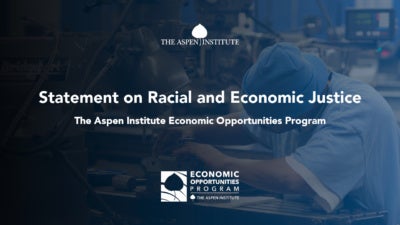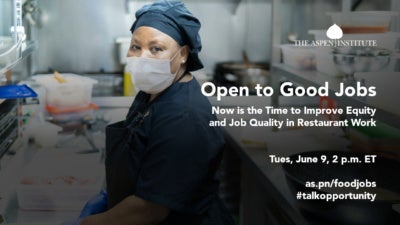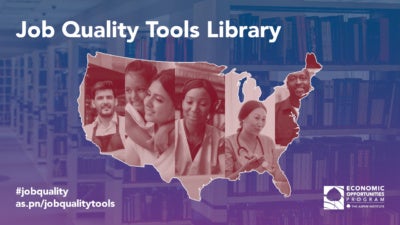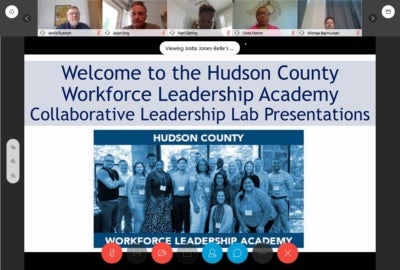The COVID-19 crisis is devastating working people and small business owners across the US. Low-income workers, people of color, and immigrant and marginalized communities bear a disproportionate burden in lost jobs, lost business, lost income, and, most alarmingly, imperiled health and lost lives. At the Aspen Institute Economic Opportunities Program, and for our many colleagues and partners, this crisis brings new urgency to our work to improve access to quality jobs, opportunities to participate in business ownership, and the freedom to pursue economic mobility. Below we share our June newsletter with highlights of recent work. As always, we welcome your feedback, thoughts, and partnership in advancing inclusive opportunity and an economy in which we all can thrive. Click here to subscribe.

Statement on Racial and Economic Justice
Recent events have demanded the nation’s attention, reflection, and action. Racism merits no place in the American ideal—we must fight against its pernicious and persistent hold on the American reality. Our work at EOP focuses on advancing a more just and inclusive economy, because racial justice cannot be won without economic justice. We see how people of color are systematically denied access to capital and entrepreneurship opportunities, and are drawn into jobs with low wages, few benefits, poor scheduling, and little chance of advancement. We all have a role to play in dismantling the systems and structures that have formed our deeply troubling reality. We recognize the responsibility that institutions like ours must take to live up to our commitment to racial equity, and we welcome your input on how we can be a stronger partner, advocate, and ally. Click here to read more.

Reinventing Restaurant Work: An Overdue Call for Equity and Job Quality
As a leading employer of women and people of color, the restaurant industry is a prime place to observe economic and racial disparities prevalent in the US workforce. On June 9, EOP hosted a virtual discussion, “Open to Good Jobs: Now is the Time to Improve Equity and Job Quality in Restaurant Work,” on the challenges and opportunities facing workers in the restaurant industry as the country comes back from COVID-19. The event featured Nikki M.G. Cole (One Fair Wage), Saru Jayaraman (One Fair Wage), Mutale Kanyanta (LOCALS Food), and Dan Simons (Farmers Restaurant Group). View the replay of this great conversation on ideas for business practices, public policies, and partnerships that can contribute to building better jobs as part of a vibrant and flourishing restaurant industry. Click here to watch.
Our speakers shed light on the historical and current conditions for workers in the industry. Most importantly, they provided innovative strategies and insights on improving equity and job quality. Jenny Weissbourd’s blog, Reinventing Restaurant Work: An Overdue Call for Equity and Job Quality, recaps this discussion and draws a picture of what is to come as the economy begins to reopen and the restaurant industry wakes from its slumber. Click here to read more.

Job Quality Tools Library
As conversations around racial injustice demand the nation’s attention and action, leaders across fields are seeking resources to help them center racial equity in their work. Last month we launched the Job Quality Tools Library, a platform to help leaders strengthen job quality in their organizations, in the businesses they partner with, and across labor markets. Working conditions that promote equity and inclusion are a critical component of job quality. The library offers tools, resources, and guidance to help a variety of types of organizations engage in practical action to improve jobs, including a dedicated page on Equity and Inclusion and related tools across all sections of the library. Click here to read more.
Advancing and Adapting CDFI Microlending
Community Development Financial Institutions (CDFIs) are an essential access point to capital for small businesses owned by people of color. We need to find ways to help them adapt and grow as they are affected by COVID-19. Business Ownership Initiative Director Joyce Klein took part in a discussion on CDFI capitalization, hosted as part of the Federal Reserve’s CDFI Symposium Webinar Series. Learn more and watch the video.
Klein also presented at a session on “New Lending: Underwriting and Credit Risk Management in Uncertain Times” at the Opportunity Finance Network’s Small Business Finance Forum, which featured three members of our Microfinance Impact Collaborative.
Responsible Business Lending Coalition Issues Statement on Racial and Economic Justice in Small Business Lending
The Responsible Business Lending Coalition (RBLC) issued a statement in response to the Black Lives Matter movement, calling for an end to racist practices in our economic and financial systems. As a founding member of the coalition, we proudly cosign this letter and join our fellow RBLC members in demanding “transparency and responsibility in lending to prevent economic injustice that perpetuates racial inequality,” including “predatory lending, which disproportionately targets Black- and minority-owned businesses.” Click here to read more.

Workforce Leadership Academies Update
Workforce Leadership Academy Fellows in Detroit took a deep dive into their systems-leadership practices this month. With the coaching of Kaye Craft (Principle, K. Craft Associates, Inc.), Fellows explored communications practices for effectively leading diverse teams. After much anticipation, Fellows in Hudson County presented their Collaborative Leadership projects to a virtual audience of stakeholders. Fellows’ recommended systems changes for the Hudson County workforce ecosystem included ideas for expanding communication and awareness among employers and job seekers about the quality and availability of training programs; developing interdisciplinary career success teams; and working with employers on developing career pathways programs.
Upcoming at EOP
In July, EOP will host a virtual discussion on how CDFIs can help small businesses affected by COVID-19, with a focus on those run by people of color. We are finalizing our date, time, and speakers and will be announcing more information soon.
For the first time in its history, the Aspen Ideas Festival will take place online, available free to participants everywhere, from June 28 to July 2. Click here to register.
On June 30, EOP Senior Project Manager Jenny Weissbourd will take part in a webinar, “Job Quality and Racial Equity in a Pandemic Economy,” featuring Clair Minson of the New Orleans Business Alliance and Zuri Stone and Robin Walker of YouthBuild Philly. Click here to register.
On July 24, EOP Senior Project Manager Jenny Weissbourd will join Job Quality Fellow Sarah Kalloch of the Good Jobs Institute on a panel focused on job quality in retail, as part of the Colorado Workforce Development Council’s Reenvisioning Retail conference. Click here to learn more.
Recent Events
On June 24, Generation Work Cuyahoga County launched an Employer Engagement Question Bank with a virtual training, part of ongoing work to align employer engagement efforts across organizations and systems serving young adults of color in northeast Ohio. The new question bank was adapted from materials developed by EOP, including a survey instrument to learn about employer engagement practices, the Reimagine Retail Question Bank, and the Toolkit to Engage Employers and Opportunity Youth on the Future of Work, developed collaboratively with the Institute’s Forum for Community Solutions. The training focused on the imperative of centering conversations with businesses using both a job quality and racial equity lens and featured EOP Senior Evaluation Manager Ranita Jain, Caryn York (Executive Director, Job Opportunities Task Force in Maryland), and Grace Heffernan (Senior Project Manager for Generation Work Cleveland|Cuyahoga County).
EOP Executive Director Maureen Conway chaired a discussion at the Beyster Symposium on “Current Research on the Outcomes of Broad-Based Equity Compensation,” featuring Bill Castellano (NJ/NY Center for Employee Ownership), Joo Hun Han (Computershare), Takao Kato (Colgate University), and Frank Shipper (Salisbury University). Click here to watch.
EOP will continue to host virtual events and webinars this summer. Join our mailing list and follow us on social media to learn when new opportunities are available.
Join the conversation
Follow us on social media to join the conversation.
Tweet What’s new at EOP? Learn how the @AspenInstitute Economic Opportunities Program is helping people connect to and thrive in a changing economy.
About EOP
The Economic Opportunities Program (EOP) advances strategies, policies, and ideas to help low- and moderate-income people thrive in a changing economy. We recognize that race, gender, and place intersect with and intensify the challenge of economic inequality and we address these dynamics by advancing an inclusive vision of economic justice. For over 25 years, EOP has focused on expanding individuals’ opportunities to connect to quality work, start businesses, and build economic stability that provides the freedom to pursue opportunity. For more information, visit as.pn/eop.
EOP has several initiatives, including the Business Ownership Initiative, Workforce Strategies Initiative, UpSkill America, and Good Companies/Good Jobs. In addition, across these approaches EOP hosts the Economic Opportunity Fellows Network and the Opportunity in America event series.
The Aspen Institute is a global nonprofit organization committed to realizing a free, just, and equitable society. Founded in 1949, the Institute drives change through dialogue, leadership, and action to help solve the most important challenges facing the United States and the world. Headquartered in Washington, DC, the Institute has a campus in Aspen, Colorado, and an international network of partners. For more information, visit aspeninstitute.org.
Thank you to our many partners and funders for supporting our efforts.
Keep in touch
Click here to join our mailing list or sign up below. For updates every day, follow us on social media.


